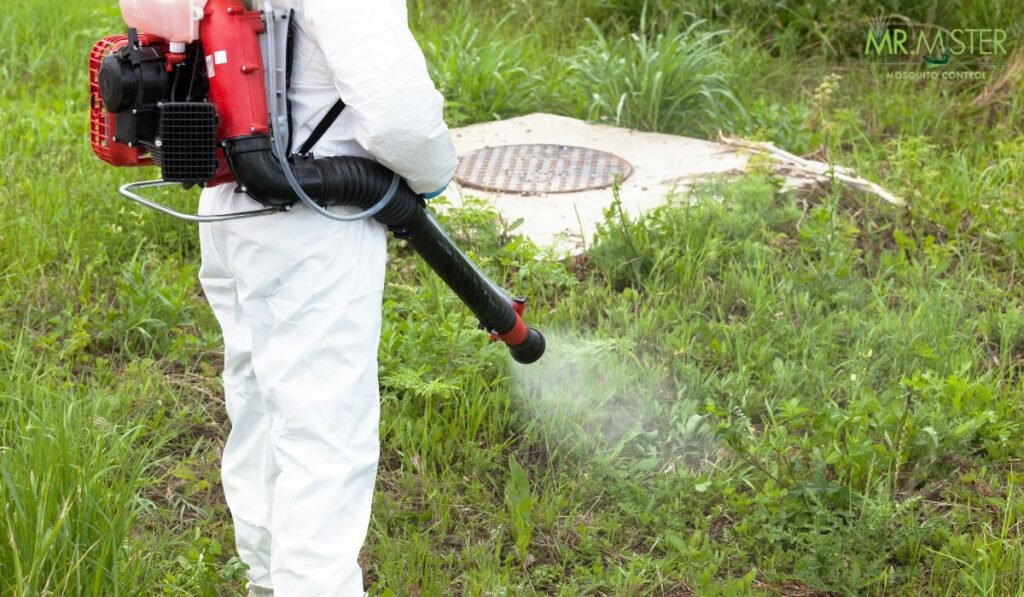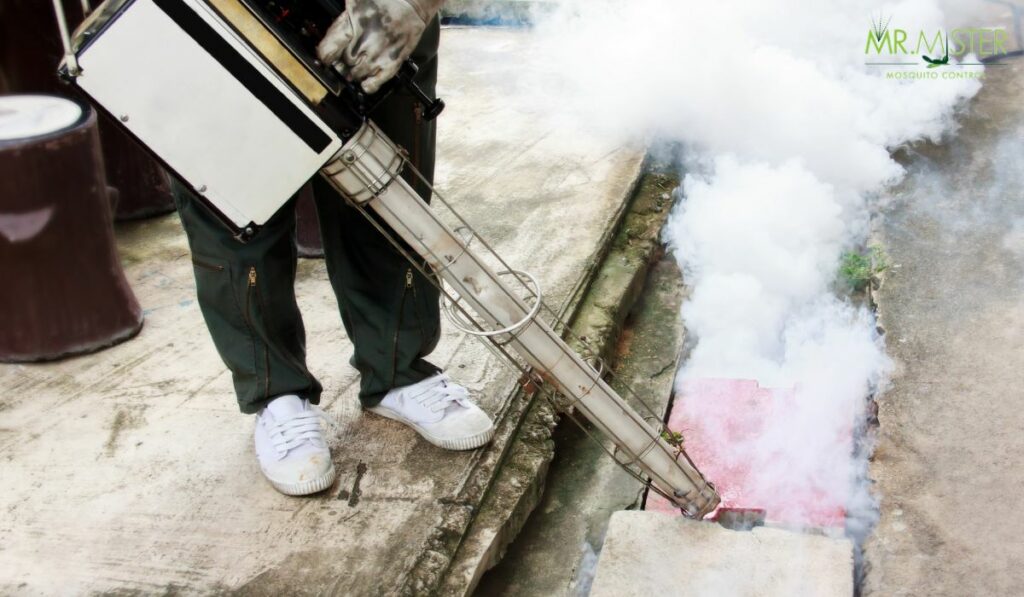Why Mosquito Control is Preferred to Mosquito Repellent
Mosquito control is preferred to mosquito repellant – and here is why in one simple sentence. It is better to prevent a problem than to protect against it. Sure, mosquito repellant is popular with those people who live in areas of the USA that are subject to mosquito attacks, particularly Atlanta. However, it is better to prevent mosquitoes from entering your yard than to protect yourself against them.
Many Atlanta residents may disagree with this – and perhaps, they believe, rightly so. Have you ever tried to keep mosquitoes out of your yard in mid-summer, particularly in damp conditions, shortly after a shower of rain? The ground and vegetation are moist and warm, and the mosquitoes are seeking a source of protein to help develop their eggs – your blood! Blood type is irrelevant to them! Nevertheless, there is a way because protection is difficult!
Do you really think that a coating of mosquito repellent on your skin will stop you from being bitten? That might be true to an extent – but only to an extent. Will you be slathering this repellent on your children? Or your pets? On everybody that visits your home? On everybody that attends a gathering in your yard or garden – barbecue, pool party, or just a general family and neighbor get-together? Not only that – but will the mosquito repellent work?
Why Mosquito Control is Best
There are mosquito control systems that will minimize the population of mosquitoes in your yard. Insect repellent is not one of them because it simply deters mosquitoes from landing on your skin. Miss a bit, and they will get you! Once females have made their minds up, then there is no stopping them! If they want to suck your blood, they will find a chink in your armor, and they will succeed!
Even now, though summer is almost on you, it is not too late to take decisive action to eliminate these creatures that will endanger not only your health but the health of your entire family and visitors to your home. And don’t forget Butch or Tom: your dogs and cats are just as susceptible as you are to mosquito attacks. All these insects want is blood – they don’t care who or what it comes from!
By taking active steps to control mosquitoes in your yard, you will reduce their population and, in many cases, totally eliminate them. Imagine a mosquito-free summer in your backyard! It is possible, but only if you start acting now!
How to Control Mosquitoes Effectively
Many of the mosquito species residents in Atlanta are known as “container breeders.” That means that they breed in still or standing water rather than in flowing rivers. Lakes, ponds, and pools are also favorite mosquito breeding grounds. Check your yard, particularly bird baths, old cans, or water lying around your drains and downpipes. If you see any small creatures swimming about, they will likely be mosquito larvae.
You must remove any containers capable of holding water in your yard – or even close to your home. Don’t just empty the water out into your yard before disposing of them because you may simply be giving the larvae a new home. Flush the water down the toilet or into a large bucket for disposal elsewhere – but not in your yard.
Mosquitoes Have Wings
A mosquito will fly a maximum of 2-3 miles from where they were hatched. If your home is within about 3 miles of a lake or marshland, then you are susceptible to mosquito attack even if you have removed all standing water from your yard. They can fly at around 1.5 mph, so it takes them only 2 hours to fly the 3 miles to your home.
Not all mosquitoes breed in containers, and the Chattahoochee River runs through Cobb, Fulton, and Gwinnett Counties. If you live in these counties, you are particularly liable to experience attacks come late spring and summer. The Nancy Creek River and Big Creek present a mosquito issue for residents of Buckhead and Alpharetta, respectively. Nobody is safe unless they take appropriate mosquito control measures.
No matter how effectively you clean out your yard, you will be prey to mosquitoes from outside your own home boundaries, particularly if you live within around 2-3 miles of one of the above counties. What you must do is create a barrier to insects, preventing them from entering the confines of your property.
Controlling Mosquitoes in Atlanta with Mosquito Misting Systems
Mr. Mister offers two types of mosquito misting or spray systems. One is the ClearZoneTM mosquito spray. This is manually applied to the underside of foliage leaves in your yard and to any other areas of vegetation that can harbor resting mosquitoes. Mosquito control is active for 21 days from application, after which it biodegrades to leave no insecticide residue behind.
The other is an automatic misting system that creates a perimeter around your home through which flying insects will be very reluctant to travel. The insecticide mist is applied automatically at preset intervals, particularly in the early evening and night when mosquitoes tend to be most active. They will be deterred from passing through this barrier because the foliage they tend to rest on is repellent and poisonous to them.
FAQs
Q: Why is mosquito control preferred over mosquito repellent?
A: Mosquito control is preferred over mosquito repellent because it targets the source of the problem rather than just repelling mosquitoes temporarily. By implementing control measures, such as eliminating breeding sites and reducing mosquito populations, it provides long-term relief and reduces the risk of mosquito-borne diseases.
Q: What are the benefits of mosquito control compared to using mosquito repellents?
A: Mosquito control offers several benefits over using repellents. It helps create a mosquito-free environment, reduces the reliance on personal protection measures, lowers the risk of mosquito bites and diseases, and provides broader protection for larger areas, such as outdoor spaces or communities.
Q: How does mosquito control work?
A: Mosquito control involves various strategies aimed at reducing mosquito populations. It may include eliminating standing water where mosquitoes breed, using larvicides to target mosquito larvae, applying adulticides to control adult mosquitoes, employing biological control methods, and implementing integrated pest management techniques tailored to specific areas or mosquito species.
Q: Is mosquito control more effective than using mosquito repellents?
A: Mosquito control is generally more effective than using repellents alone. While repellents provide temporary relief by deterring mosquitoes, control measures directly target mosquito populations, interrupt their breeding cycles, and reduce their overall numbers, providing more sustained protection and minimizing the need for constant personal application of repellents.
Q: Can mosquito control methods completely eliminate mosquitoes?
A: While mosquito control methods can significantly reduce mosquito populations, it is challenging to completely eliminate mosquitoes entirely. Mosquitoes are adaptable insects that can breed in various environments. However, effective control measures can greatly diminish their numbers and significantly mitigate the risk of mosquito-borne diseases.
Q: Are there any disadvantages or risks associated with mosquito control?
A: Some mosquito control methods may pose certain risks or disadvantages. For instance, certain chemical-based control methods can have potential environmental impacts or may require professional expertise for application. It’s important to use control methods responsibly and follow recommended guidelines to minimize any adverse effects.
Q: What are some common mosquito control methods?
A: Common mosquito control methods include eliminating stagnant water sources, using larvicides to target mosquito larvae, applying adulticides to control adult mosquitoes, utilizing mosquito traps, implementing biological control measures (e.g., introducing mosquito-eating fish or using bacteria that kill mosquito larvae), and employing integrated pest management techniques.
Q: Can I use both mosquito control and mosquito repellents together for better protection?
A: Yes, using both mosquito control and mosquito repellents together can provide enhanced protection. Implementing mosquito control measures to reduce mosquito populations in the surroundings, combined with the use of personal mosquito repellents, can create a layered defense against mosquitoes, further reducing the risk of bites and mosquito-borne diseases.
Q: Are there any natural or eco-friendly mosquito control options available?
A: Yes, there are natural and eco-friendly mosquito control options available. These include using mosquito-repelling plants, such as citronella, lavender, or lemon balm, installing mosquito nets or screens, employing natural larvicides like Bacillus thuringiensis israelensis (Bti), and encouraging natural predators like bats, dragonflies, or birds that feed on mosquitoes.
Q: How long does the effect of mosquito control last?
A: The duration of the effect of mosquito control measures can vary depending on the specific method used and environmental factors. Some control methods, such as larvicides, may provide extended protection by targeting mosquito larvae for a certain period. Other methods, like adulticides, may have a shorter-term effect and require periodic application to maintain control. Regular monitoring and implementing appropriate control measures can help sustain the desired level of mosquito control.
Conclusion
It is always best to prevent mosquitoes from entering your yard than using chemicals on your skin to repel them. Many people have used Mr. Mister to provide them with a mosquito-free yard all year round. They have had no reason to use mosquito repellent as their primary means of protection. You can still use it if a repellent makes you feel safer, though only small amounts on exposed skin would be necessary. Mosquito control is always better than mosquito repellent.
Contact Mr. Mister today at (404) 941-0720 or by using our online Contact Form.
* Schedule a Free Mosquito Control Consultation – 404-941-0720 *
* Guaranteed Results * 100% Biodegradable * Locally Owned







